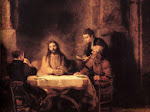The New Testament seems to hold a different view. It uses the word "saints" over 60 times, usually to refer to any believer who is "in Christ" -that is whom Christ dwells. Some New Testament versions translate the Greek word hagios, as the holy ones.
 |
| Fra Angelico. The Forerunners of Christ with Saints and Martyrs (about 1423-24) |
The New Testament writers did not employ a rose colored filter. They knew well that all believers are sinners. Yet they did not shy away from using the term saints (holy ones) broadly to apply to all believers. Why?
St. Paul asserts, in his Epistle to the Romans that God applies the righteousness of Christ to us sinners through faith. In other words, though we deserve punishment, since Jesus Christ completely lived a holy life, and because He fully paid for our sins by His death at the Cross; when we fully place our faith in Christ as paying the price for our sins, God looks at us as though we lived as holy a life as Jesus did. (Romans 3:21-31)
St. Paul goes on to clarify - this teaching does not mean we can simply sin all we want. Instead, he asserts we are dead to sin, but alive in Christ. (Romans 6:11)
No doubt, we all sin. So John says if we claim to have no sin, we are not truthful. (1 John 1:8 & 10) Instead, he urges us to confess our sins. (1 John 1:9) John goes on to urge all of us to live a holy life.
St. Peter sums this up when he recalls what God says in the Old Testament, But just as he who called you is holy, so be holy in all you do; for it is written: Be holy, because I am holy. (1 Peter 1:15-16 - referencing passages in Leviticus) Peter addresses this to all believers, not just to a select few. He urges all of us to live a holy life.
Probably the best way to think about holiness is as a journey. Isaiah refers to a highway called a way of holiness (Isiah 35:8). As sinners, we embark on a journey where God, through His Holy Spirit, transforms us, step by step, into holiness. Though we never quite arrive, we embarked on that journey and hopefully progress on that highway. Though we may sin, we confess it, receive God's forgiveness, and continue on that journey.





